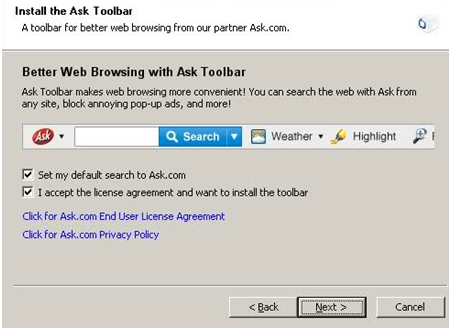It is recommended to always be careful when looking for, downloading or installing new software. In this article we will show you what the most common risks that come along with the installation of new apps (especially freeware) are. In addition, you will also be presented with some methods that can be used to minimize these risks.
Toolbars

Some toolbars may actually steal personal information from your computer. If you are not careful, even legitimate ones can gather this kind of information very quickly, straight from your web browser. One or two toolbars can be useful, especially if they make use of a search engine that you use often, such as Google. But if you have too many toolbars, things are changing in a negative way.
Often, new applications will attempt to install them and some toolbars have nothing in common with those applications. Finally, you may end up in a point where you have more browser toolbars than websites you actually visit.
A lot of free applications such as screen savers will try to trick you into accepting a toolbar. Those applications are free because advertisers sponsor it for introducing a toolbar in the installation process. Read carefully about what you are offered and make sure you do not accept the installation of free toolbars, except the ones you are really planning to use.
To be able to use them for free, some applications will even force you to install a toolbar. Make sure this decision is worth the risk before accepting these terms, because sometimes toolbars may prove quite difficult to uninstall.
Offers of unwanted software
In addition to toolbars, there are other types of applications that are offered as a gift or required when you are installing free applications. These include several types of software. Some of these programs may contain malware, so make sure you are well informed before installing unknown programs in your machine. Fortunately, plenty of information can be found on the web and will help you stay away from any risk.
Another type of unwanted software is web browsers that can be modified to include malevolent features, such as monitoring your activity or stealing your personal information. If you install a web browser, it is much safer to go directly to the source (the official website of the developer). It is recommended not to accept browsers included with other software, or those offered by advertising schemes on the Internet.
Finally, some applications may ask you or require you to register your email account for receiving unsolicited. Other will change the home page of one or more browsers installed on your machine and will subscribe you to unwanted promotions. Before providing your email address to unknown software developers, it is therefore best to read the terms and conditions carefully.
These tips should help you stay away from any harmful applications that you can find on the Internet. Use them cautiously and remember that not all freeware software should be regarded as a bonus or something beneficial for your machine.




